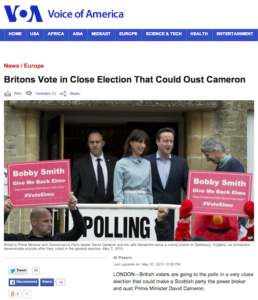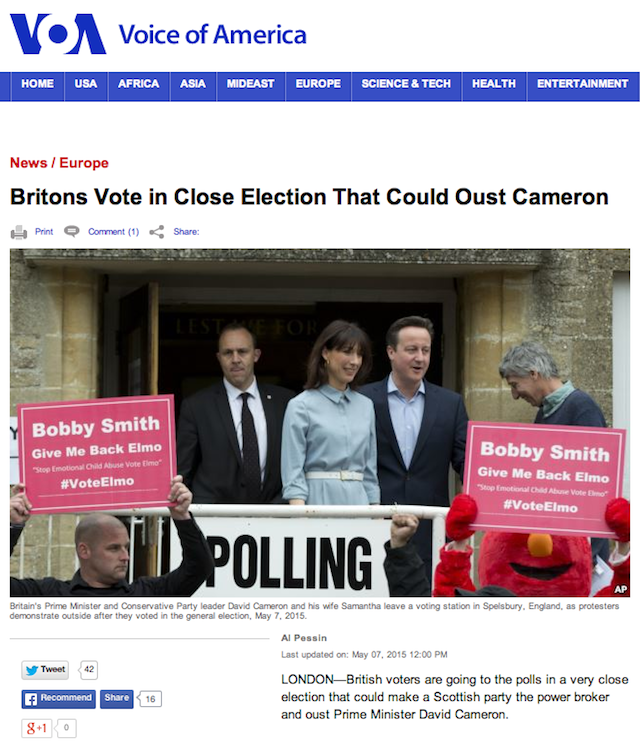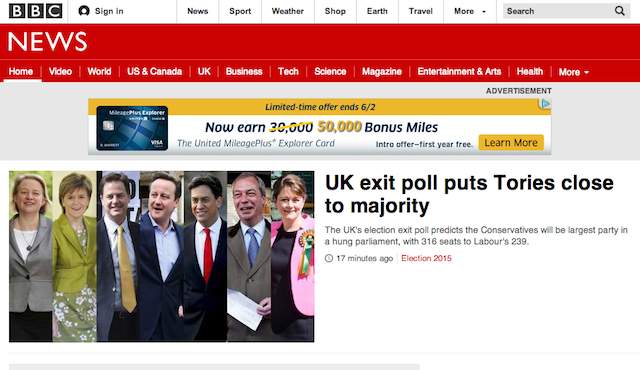BBG Watch Media
 A Voice of America (VOA) news report speculates that British voters “could make a Scottish party the power broker and oust Prime Minister David Cameron” in a close election.
A Voice of America (VOA) news report speculates that British voters “could make a Scottish party the power broker and oust Prime Minister David Cameron” in a close election.
VOA, May 07, 2015 12:00 PM ET: “British voters are going to the polls in a very close election that could make a Scottish party the power broker and oust Prime Minister David Cameron.
Public opinion polls indicate Prime Minister Cameron’s Conservative Party will fall well short of a parliamentary majority, even with his current coalition partner, the Liberal Democrats.”
SEE: Britons Vote in Close Election That Could Oust Cameron, Al Pessin, Voice of America, May 07, 2015
BBG WATCH UPDATE: At about 5:15 PM ET, BBC showed the Voice of America how unwise it is journalistically to try to speculate on results of elections that are deemed to be very close and try to predict someone’s political ouster.
Voice of America Screen Shot 2015-05-07 at 2:33 PM ET
BBC Homepage Screen Shot 2015-05-07 at 5:27 PM ET
SEE: Election 2015: Exit poll puts Tories close to majority | BBC
Voice of America later changed its speculative headline, “Britons Vote in Close Election That Could Oust Cameron | VOA” to “Britain Locked in Too-Close-to-Call Election | VOA ” and made corrections in VOA’s earlier report to eliminate speculations of David Cameron’s ouster.
END OF BBG WATCH UPDATE
BBC UK vote coverage has been more cautious so far.
BBC, May 07, 2015 12:00 PM ET: “Millions of voters are going to the polls across the UK.
After six weeks of campaigning and debate, people have been casting their vote at around 50,000 polling stations.
Polls close at 22:00 BST with results from the first constituencies expected before midnight and the final result due on Friday afternoon.”
SEE: Election 2015: Millions vote in UK general election, BBC, May 07, 2015
Russia’s RT is also more cautious in its UK election coverage than the U.S. taxpayer-funded Voice of America.
RT, Thursday, May 7 18:08 GMT: “David Cameron reportedly is planning to declare victory if the Conservatives win more seats than Labour, even if Labour and the SNP together will end up having more seats in Parliament.
The People’s Assembly announced it will hold a demonstration on Saturday, May 9, outside Downing Street if this happens. The left-wing group writes on their website, “We cannot allow the Tories to get away with using a flagrant abuse of power to impose the most severe austerity this country has seen since the Second World War.”
SEE: UK General Election 2015 LIVE UPDATES, RT, May 7, 2015
Germany’s Deutsche Welle (DW) is also avoiding speculating on the outcome of the British vote.
DW: “The number of people in jobs in the UK has hit a record high. On the eve of an election that could go either way, Prime Minister David Cameron says the stellar data is thanks to his government’s job creation miracle. But the opposition points out the slow pace of recovery in living standards in Britain under Cameron’s reign.”
SEE: Economy is main issue in British election, Birgit Maass, Deutsche Welle (DW), May 6, 2015
DW VIDEO
Al Jazeera also has a cautious headline, “Britain goes to polls in election dubbed unpredictable | Al Jazeera, and its report avoids speculation about any specific election vote result or future government outcome. Aljazeera report says that “With no party likely to win a majority, analysts say assembling a government could take days or weeks.”
###
Voice of America News Report
Britons Vote in Close Election That Could Oust Cameron
LONDON—British voters are going to the polls in a very close election that could make a Scottish party the power broker and oust Prime Minister David Cameron. Public opinion polls indicate Prime Minister Cameron’s Conservative Party will fall well short of a parliamentary majority, even with his current coalition partner, the Liberal Democrats. National survey results Wednesday showed Prime Minister David Cameron’s Conservative party with support from 33 percent of British voters. Ed Milliband’s main opposition Labor party was just one point behind. The polling suggests that the election results could force either of Britain’s two main political parties to form a new coalition government with any of several parties collecting a smaller share of seats in the 650-member House of Commons. The Labor Party, under Ed Miliband, is expected to get about the same number of seats as the Conservatives, but experts say Miliband will have an easier time finding partners for a new governing coalition. Hung parliament likely “There is most likely to be a hung parliament,” Professor Tony Travers of the London School of Economics told VOA affiliate Al Hurra television. “And if that is the case, at the moment, it looks slightly easier for the Labor Party to form a minority government than the Conservatives, simply because there are more parties that would be prepared to work them.” Analysts are calling the election Britain’s most unpredictable and consequential in a generation. Cameron has promised if re-elected to hold a referendum on whether Britain should stay in the 28-nation European Union. The question of Scottish independence from Britain remains as a key issue. Scottish nationalists lost a plebiscite last year, but could emerge with the third biggest bloc of seats in Thursday’s voting and form a coalition with the Labor party. Cameron, Britain’s leader since 2010, and Miliband have both cast the election as a referendum on the country’s economy, the world’s fifth largest. ”People really want to think carefully before casting their vote,” Cameron said at a campaign stop at a farm, “but I believe when the crunch comes, when they ask themselves the question: Do I trust Ed Miliband with the economy or do I want to stick with a plan and a team that’s turning the country round? I think we can do very well on Thursday and cross that line.” Miliband has attempted to characterize Cameron’s Tories as the party of the wealthy. “This is the clearest choice that has been put before the British people for a generation,” Miliband said, “between a Tory government that works only for the privileged few or a Labor government that will put working families first.” Voter concerns Anxiety about the future was reflected in comments by people at one London polling station on Thursday. “It is a question of whether this country goes forward or backward,” said Michael, a retired stock broker. “I found it actually quite difficult, and normally I do not. I normally know who I vote for.,” admitted Linda, a charity trustee. ” I have always voted for the same party. This year I have found it slightly difficult.” “It is unfortunate that in this system where the party that is the most popular will not have enough of a majority of seats to win,” said Hanid an entrepreneur. “And therefore, this time around it is going to be more important who you vote for.” WATCH: London voters discuss close election Main campaign issues The campaign has been mainly about the economy. The Conservatives accuse Labor of borrowing and spending too much when it was in power and contributing to the recession of 2008. Labor says Conservative policies during the past five years have cut too many public services. Professor Simon Hix of the London School of Economics says the two parties present a real choice for voters. “The big difference in this election is economics, I mean really big difference,” Hix noted. ” I think we are seeing a choice for the Conservatives of a policy of more cuts in spending and meeting Britain’s deficit reduction within a five-year parliament. And Labor is saying ‘No, much slower deficit reduction, committing more money to spend on the NHS (National Health Service) and other areas of public spending.’ That is quite a stark economic difference.” The election is so close that it will likely be well into the wee hours of Friday before the results are known, and possibly several more days before party leaders can negotiate the formation of a new government. Some material for this report came from the Associated Press.
Last updated on: May 07, 2015 12:00 PM


